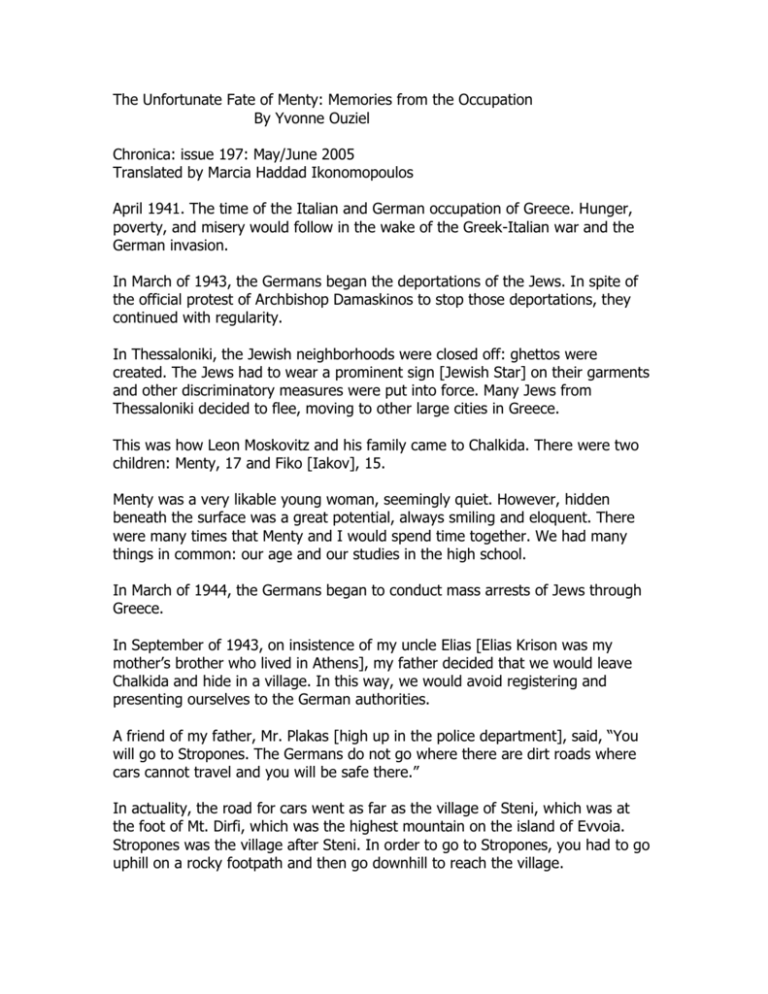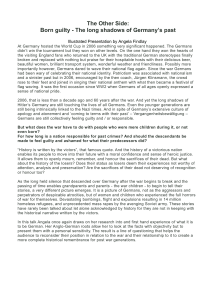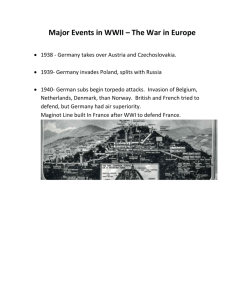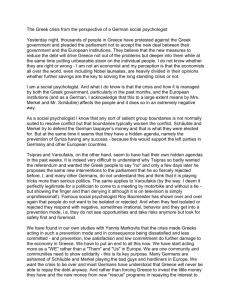The Unfortunate Fate of Mendy: Memories from the Occupation
advertisement

The Unfortunate Fate of Menty: Memories from the Occupation By Yvonne Ouziel Chronica: issue 197: May/June 2005 Translated by Marcia Haddad Ikonomopoulos April 1941. The time of the Italian and German occupation of Greece. Hunger, poverty, and misery would follow in the wake of the Greek-Italian war and the German invasion. In March of 1943, the Germans began the deportations of the Jews. In spite of the official protest of Archbishop Damaskinos to stop those deportations, they continued with regularity. In Thessaloniki, the Jewish neighborhoods were closed off: ghettos were created. The Jews had to wear a prominent sign [Jewish Star] on their garments and other discriminatory measures were put into force. Many Jews from Thessaloniki decided to flee, moving to other large cities in Greece. This was how Leon Moskovitz and his family came to Chalkida. There were two children: Menty, 17 and Fiko [Iakov], 15. Menty was a very likable young woman, seemingly quiet. However, hidden beneath the surface was a great potential, always smiling and eloquent. There were many times that Menty and I would spend time together. We had many things in common: our age and our studies in the high school. In March of 1944, the Germans began to conduct mass arrests of Jews through Greece. In September of 1943, on insistence of my uncle Elias [Elias Krison was my mother’s brother who lived in Athens], my father decided that we would leave Chalkida and hide in a village. In this way, we would avoid registering and presenting ourselves to the German authorities. A friend of my father, Mr. Plakas [high up in the police department], said, “You will go to Stropones. The Germans do not go where there are dirt roads where cars cannot travel and you will be safe there.” In actuality, the road for cars went as far as the village of Steni, which was at the foot of Mt. Dirfi, which was the highest mountain on the island of Evvoia. Stropones was the village after Steni. In order to go to Stropones, you had to go uphill on a rocky footpath and then go downhill to reach the village. It was recommended that we take long, warm, wool clothing and blankets because the winters were very cold there. We quickly packed the necessary items in valises and a large bundle, crying that we felt warm [and did not need these items]. The whole family, my parents and six children [three girls and three boys] left Chalkida at noon in a truck, and we arrived at Steni in the afternoon. The entire journey was wretched. All kinds of thoughts were tumbling through our minds but no one spoke. What would become of us? Where would we wind up? Only our mother spoke, saying that the Almighty God would protect us. Steni had natural beauty. A large stream ran through the village. Centuries old plane trees and tall pines hid the sun with their dense foliage, while birds sang hymns to a benevolent God and a fragrant breeze blew through the trees. We were going to be staying at the first house in the village. The owner was Charalambros Papakirikos, a strongly built, tall man of about 60 years old. He was a retired schoolteacher. His wife was a cheerful, plump woman named Katerina. They welcomed us. My father told them that our destination was the village of Stropones. “Zacharia [that was my father’s name], don’t go there,” said the teacher. “That village gets closed off by the snow in the winter. You have a large family: six children. What if something happens? There is no doctor, not even a pharmacy.” Suddenly, three Germans came into view. They had arrived by foot from Stropones and were heading towards Chalkida. What were they looking for? We did not ask. We were shaking with fear. In broken English, they asked for food. Katerina was very attentive to them. She fed them sausages, French-fried potatoes and wine. They filled themselves, thanked Katerina, and disappeared into the darkness. “Even though Stropones does not have a road which automobiles can navigate, that is where the Germans came from,” the teacher said to my father. That is how we wound up staying in Steni. About 2-3 weeks had passed. My father grumbled at my mother. “Your brother is always exaggerating! We left our house, deserted my store, the children have not gone to school. What are we doing here? I am calling for a car to come this Sunday and we will return to Chalkida.” My mother did not say anything but she was very sad. My father, Zakarias Koen, along with his brother, Joseph, had run a novelty shop on Ermou Street in the commercial center of Chalkida. They ran the place themselves. The following day, the teacher came with a newspaper and read the German orders published there to my father. _____All Jews had to register. Those absent from their homes had to return by order of the Germans. All those who harbor Jews will be punished. And many other orders which I do not remember. By noon on Saturday, many of our fellow Jews from Chalkida had arrived in the village with their families. The command headquarters of EAM was stationed in Steni. The villagers did not want to rent their homes to Jews! EAM commanded them to rent their homes to Jews. “Where will these people stay? Winter is coming. They are Greeks. We fought together in Albania. We served in the army together.” Thus, the villagers were persuaded. I personally remember the Military Hospital [today housing the Military School of Chalkida] during the War of 1940 [War on the Albanian Front]. There was a large chamber filled with Jewish injured, with amputated feet, severe injuries and frostbite. The Jewish Community of Chalkida had visited them bringing sweets and refreshments. That is how I was present. Days passed. We lived with great deprivation, always in fear that the Germans would come. The winter of 1944 was coming. There were many storms followed by periods of sunshine. I remember that there was snow in the village on the first of April. Menty’s family was staying in Lower Steni, which was in a valley. It was about one kilometer from Upper Steni, where we were staying. There were many times that Menty would come with her mother and her brother Fiko to Upper Steni. My three sisters and I would go with Menty, walking through the streams and mountain ridges. We would gather wild flowers and talk about many different things. One day, Menty said to me, “I am going to the surrounding villages, accompanied by my mother, to enlighten people about EAM. You should also be going. After all, we owe our salvation to EAM.” However, my father did not accept this. My mother was suffering from high blood pressure, with bouts of dizziness and other problems. The three sisters were taking care of the house. Wee were eight people in the family. None of the houses had indoor water supply. We would carry the water for long distances in heavy clay pitchers and large metal buckets. In the evening, we would knit heavy woolen pullovers and socks for the men. One morning [it was the beginning of February] I saw a note under the doormat. I went down and saw, with great surprise, that it was from Menty. “Our family is going to Stropones. While you are sleeping the sweet pre-dawn sleep, I am following my own road to my fate.” I was very sad because I did not have any other friends here. However, the phrase, “I am following my own road to my fate,” made a great impression on me. I tried to explain what she meant by that phrase. We had been in the village for five months and the Germans had not come. The andartes [resistance fighters] had murdered many Germans and had blown up many of their supply posts. Therefore, the Germans decided to conduct a “combing” of the area. “Combing” was the expression used to describe cleaning-out operations in the villages to force the andartes to flee to the mountains. One day [I remember it was in the middle of March], my mother said to me, “We have to fast today. Tomorrow is Purim.” That day, the Germans arrived in Steni for a “combing.” It was fatal for Menty. Early in the morning I heard loud noises from car exhausts and savage loud voices talking in German and Greek. The square across from our house was filled trucks with German and Greek soldiers. How could we leave the house? Where could we go? We were terrified. Katerina, the woman who owned the house, came to our house. “Come, get dressed as village women,” she said to the three girls, “so that the Germans will not know that you are Jewish.” She then brought out peasant skirts and blouses and yellow scarves. “Are we dressing for Purim?” my two little sisters asked. “No one is to go outside. Be very careful,” Katerina said to us. My father went and said good morning to a Greek soldier and began to talk to him. Before long, Angelos [the soldier] sent two Greek soldiers and posted them outside our house. The Germans passed, came close, spoke to the Greek soldiers and left. In the distance, I heard savage German voices and gunshots. It was twelve noon when I heard voices, crying and laments. A villager had been killed and his family was taking him to the cemetery, which was only a short distance from our house. We [I, my two sisters, Matildi and Thelma and Eftihia Negrin] ran to the window to see what was happening. Eftihia Negrin [now Mrs. Emmanuel Avdela] had come from Athens with her parents to hide in Steni. Then, I saw a German [he would have been an officer since he was wearing a cap with an insignia] looking through binoculars at our window. He did this for a long time but I gave it no importance. Before long, Angelos Theou, the Greek colonel, was berserk and screamed at us, “Bad girls, get away from the window. That German is looking at you with his binoculars.” He was shaking. “Don’t you know what awaits you if he gets his hands on you. He is attached to the SS. He has been drinking and is drunk. He beats his victims with a whip. He will rape you and kill you.” We turned pale and were speechless. Katerina heard the voices and came and covered the window with the curtain. The Germans, along with the Security Battalion, went by foot on the ridge towards Stropones. Just what the Greek colonel had said took place. Someone had informed on Menty and said that she was working with EAM. The Germans hoped a door and threw Menty out from the courtyard balcony on to the ground below. Even after all these years, tears still come to my eyes when I think about it. Menty got up and staggered. There was a full moon. The sky was without clouds. The monster saw her. It was her fate. The village priest wrapped her in a white sheet and buried her in the Jewish tradition. The following day, after the Germans had left, the andartes killed the young man who had informed on her. The German rationalized her death by saying that he had seen other Jews in Steni but she [Menty] was working with EAM. Today, Menty is interred in the Jewish cemetery of Chalkida. There were Jews from Chalkida who perished in the Nazi concentration camps. Some were saved by escaping to Israel [Palestine]. However, many others owe their lives to the sacrifices of Christian villagers and the solidarity of the andartes EAM. That was what happened with my family.








